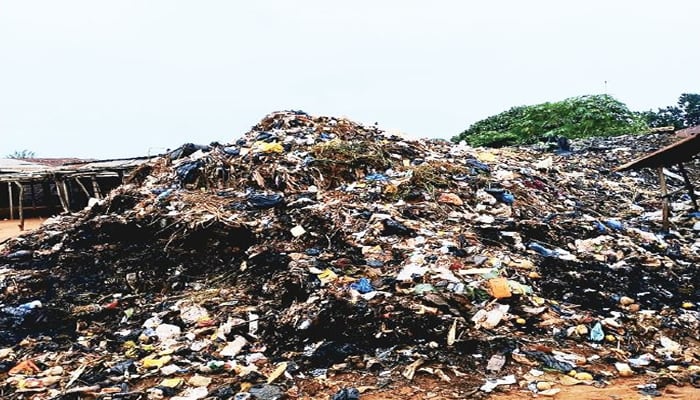Metro
Residents fear disease outbreak as refuse takes over Lagos roads

Residents across Lagos have expressed fears of a possible disease outbreak as heaps of refuse now litter major roads in several parts of the state.
From Iyana-Ipaja to Abule Egba, Oshodi, and Iyana-Iba, PUNCH Metro observed that piles of waste have become a common sight.
It was a similar sight along the Isheri-Jakande road, in Agege, and in some parts of Lagos Island in the state.
The development, however, left residents worried about its health implications.
The residents who spoke to our correspondents during separate interviews on Saturday also cited government neglect.
A resident in the Igando area, Kunle Ayeni, said the situation had persisted for over three months with no visible intervention from waste management authorities.
According to him, the heaps of refuse have not only taken over parts of the road but have also become a major source of discomfort for residents and commuters.
“The smell is terrible, especially when it rains. The stench from the refuse spreads across the street and into our houses. Sometimes, we can’t even open our windows. Flies have taken over everywhere. We’ve reported to the PSP office in the area, but nothing has been done.”
Speaking in a similar tone, a resident along the Isheri-Jakande Road, Deola Davies, expressed concern about the lack of attention the situation was receiving from the government.
She said, “This issue of refuse littering the roads is no longer new to us here. It has now become a serious issue, and it looks like we don’t have a government in the state anymore. People dump refuse on the median, and the PSP operators leave it there. And what is left for us is to start inhaling the odour. Those parts of the roads now stink.”
Another resident, Funmi Adagba, said the refuse spends close to two weeks on the road without being cleared.
She said, “The refuse is being left on the road for close to two weeks, and sometimes, it becomes excessive and starts to spill on the road. Please, we need the government’s attention on this.”
Some residents also blamed the situation on the alleged inefficiency of waste management operators.
Speaking to our correspondents, the residents said that despite regular payments to Private Sector Participants operators, refuse collection has become irregular and poorly supervised.
At Shibiri, in the Ojo area, a resident, Esther Owobayi, said the operators now come to collect refuse once a month.
He said, “The refuse collectors usually come weekly, but that is no longer the case. They now come sometimes, once a month, or even skip months. But this does not stop them from collecting LAWMA dues from us. If you don’t pay, they’ll seal your house.”
Another resident, Funmilayo Ojo, blamed weak enforcement and poor monitoring for the worsening refuse crisis.
She said, “PSP acts like they’re untouchable. When we complain, nothing happens even though we pay regularly. Maybe because there’s no proper monitoring and strict law enforcement. Sometimes, for weeks or months, they won’t come at all. The experience we’ve had with PSP here is the worst.”
At Oshodi Market, traders now sell beside heaps of refuse, enduring foul odours as they go about their daily business.
“We endure the smell because there’s no other space to sell. Oshodi market is big, but the waste trucks are not enough to carry the daily refuse,” a trader, Kudirat Bose, told PUNCH Metro.
Another trader, Chioma Nwachukwu, said the government should provide more mini-trucks for waste collection.
“We can’t blame people for dumping dirt on the road. We pay different levies and waste bills, but the trucks can’t handle the load,” she said.
In the nearby Ajao Estate area of the state, our correspondent observed heaps of refuse on the roads and house corners. A resident, Lawal Ishola, lamented that the refuse in front of his house had not been picked up for over three weeks.
He said, “The PSP operators in our estate appear to be on holiday because they have not come to collect the refuse on the house corners even after we pay our monthly fees. This is most disheartening.”
When PUNCH Metro visited Iyana-Ipaja, mounds of decaying refuse were already spilling onto the road.
At the Ekoro Road in Abule Egba, a hill of garbage made up of plastic bottles, vegetable remains, and nylon waste buzzed with flies.
Traders, however, said the heaps of refuse return within some days after being cleared.
“They cleared it last week, but before you know it, the dirt comes back again. It’s like nobody cares,” a roadside trader, Shade Opeyemi, disclosed.
Another resident, Tosin Akintunde, blamed high waste collection charges for the indiscriminate dumping.
“Although the PSP operators come to collect refuse, their bills are expensive. That’s why many people dump their waste on the streets,” she said.
On Friday, a large heap of refuse was seen defacing the popular roundabout leading directly to Tafawa Balewa Square on Lagos Island.
When our correspondent revisited the area about five hours later, the waste had spread further onto a section of the road.
Nearby, street traders, including those selling food items, continued their business beside the growing dump as observed during the visit.
The Lagos State Ministry of Environment and Water Resources, however, attributed the persistent dumping of refuse on road medians and public spaces across the state to residents’ unwillingness to pay for waste disposal services.
The ministry’s spokesperson, Kunle Adeshina, during a telephone interview with PUNCH Metro on Sunday, said the state had no fewer than 100 waste collection trucks but continued to face challenges due to widespread default in payment.
He said, “The main problem is that some Lagos residents don’t want to pay for the refuse they generate. The PSP operators are businessmen. They bought their trucks with their own money and employ staff who must be paid. If they collect your refuse and you don’t pay, the debt accumulates.”
Adeshina explained that the Private Sector Participants operators had long been grappling with non-payment issues, while the state government continued to exercise restraint in enforcing penalties.
He said, “The PSP operators have been contending with this problem for a long time. The state government is trying its best not to apply an iron hand. Basically, the problem is that people don’t want to pay.”
He added that many residents deliberately dump waste at odd hours, relying on the Lagos Waste Management Authority to clear it.
“People leave their houses very early in the morning to dump refuse on the median because they know LAWMA will pick it up. If LAWMA clears a spot by 4am, by 6am the place is filled up again,” Adeshina lamented, adding that the government was already considering alternative measures to curb the trend.
He further disclosed that many households owed PSP operators up to six months in arrears, making it difficult for them to sustain operations.
“People owe five to six months. How do they expect the PSP operators to pay staff salaries or maintain their trucks?” he queried.
In efforts to address the growing menace of roadside dumping, Adeshina said the ministry had intensified enforcement through its community waste policing system.
“We have a community waste policing system, and that’s why several offenders have been arrested. Unfortunately, this has not deterred many. But we will continue. If we find a heap of refuse in front of a shop or building, the owner will be held accountable,” he warned.
Environmental health experts have warned that the accumulation of refuse could expose residents to outbreaks of diseases such as cholera and dysentery if urgent action is not taken.(Punch)
-

 News20 hours ago
News20 hours agoNo substantial reason to stop new tax laws… January 1 commencement sacrosanct – Tinubu
-

 News9 hours ago
News9 hours agoCourt Sends Bauchi Finance Commissioner to Kuje Prison Over ₦4.6bn
-

 Politics21 hours ago
Politics21 hours agoFubara: We won’t make mistake again in Rivers come 2027 – Wike
-

 News9 hours ago
News9 hours agoRivers lawmakers reject Fubara’s N100,000 Christmas bonus
-

 News9 hours ago
News9 hours agoFatal crash: Family demands access to Joshua, FRSC awaits probe report
-

 Politics9 hours ago
Politics9 hours ago2027: ‘Call Me Stupid, I’m Still Running for Presidency’ – Obi Reacts to Insults
-

 Business10 hours ago
Business10 hours agoBurna Boy’s ‘I Told Them’ is highest-grossing tour by African artiste with $30.5m – Report
-

 Politics10 hours ago
Politics10 hours agoWike’s kinsmen endorse Fubara for second tenure


















